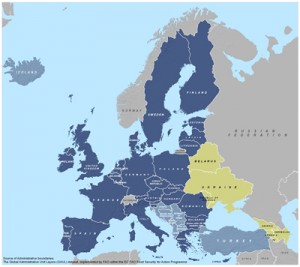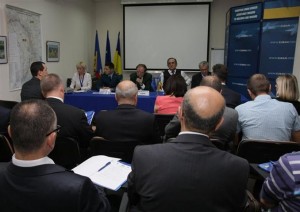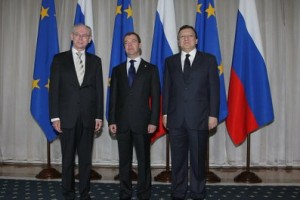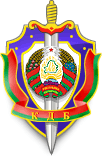EU Eastern Dimension
The Heads of State and Government and representatives of the EU and its member states express their deep concern at the deteriorating human rights, democracy and rule of law situation in Belarus, deplore the continuing deterioration of media freedom in Belarus and call for the immediate release and rehabilitation of all political prisoners, an end to the repression of civil society and media and the start of a political dialogue with the opposition. The EU is also deeply concerned about reports that prisoners are denied access to their families and lawyers as well as to medical care while being put under psychological and physical pressure. The European Union has consistently offered to deepen its relations with Belarus and, while reaffirming its policy of critical engagement, reiterates that such a deepening is conditional on progress towards respect by the Belarusian authorities for democracy, the rule of law and human rights.

From EU site
The Heads of State or Government and representatives of the Republic of Armenia, the Republic of Azerbaijan, Georgia, the Republic of Moldova and Ukraine, the representatives of the European Union and the Heads of State and Government and representatives of its Member States have met in Warsaw on 29-30 September 2011 to renew their commitment to the objectives and continued implementation of the Eastern Partnership. The President of the European Parliament and the representatives of the Committee of the Regions, the Economic and Social Committee, the European Investment Bank and the European Bank for Reconstruction and Development were also present at the Summit.
The Prague Summit in May 2009 launched a strategic and ambitious Eastern Partnership as a specific dimension of the European Neighbourhood Policy, to further support Eastern European countries’ sustainable reform processes with a view to accelerating their politicalassociation and economic integration with the European Union. The agenda agreed in Prague contains the guiding principles of the Eastern Partnership, and the participants of the Warsaw Summit re-affirm their commitment to implement them fully.
The Warsaw Summit recognises that reinforced reform efforts serve a common interest, and need therefore to be applied in a spirit of shared ownership and mutual accountability. The Eastern Partnership is based on a community of values and principles of liberty, democracy, respect for human rights and fundamental freedoms, and the rule of law. All countries participating in the Eastern Partnership are committed to these values through the relevant international instruments. Any European Union Member State is also committed to them through the Treaty on European Union.
The participants of the Warsaw Summit acknowledge the European aspirations and the European choice of some partners and their commitment to build deep and sustainable democracy. They highlighted the particular role for the Eastern Partnership to support those who seek an ever closer relationship with the EU.
Much has been achieved already. Political and economic reforms have been implemented in partner countries and relations between the EU and its Eastern European partners have deepened significantly. There is more trade and economic interaction between the EU and its Eastern European partners than ever before. In order to consolidate this trend, the EU and most of its partners are engaged in negotiations on Association Agreements which will also lead to Deep and Comprehensive Free Trade Areas as soon as the conditions are met.
At the same time, they are engaged in progressing towards increased mobility across the continent. Dialogues on visa-free regimes have been launched with Ukraine and the Republic of Moldova. Visa-facilitation and readmission agreements are being implemented with Georgia and similar agreements will be sought with the Republic of Armenia, the Republic of Azerbaijan and the Republic of Belarus.
It is part of the essence of the Eastern Partnership to engage with all strands of societies, beyond governments. The Warsaw Summit welcomes the establishment of the Euronest Parliamentary Assembly, as well as the increased role of civil society, through the Civil Society Forum. It welcomes the creation of an Eastern Partnership Business Forum and of the Conference of Regional and Local Authorities of the Eastern Partnership.
Recognising and welcoming the progress made so far, the participants of the Warsaw Summit underlined that much remains to be done to reach the goals of the Eastern Partnership, including by adapting existing instruments of co-operation. In this regard, they welcomed the publication of the Communication of the High Representative and the Commission on the review of the European Neighbourhood Policy. Greater differentiation and mutual accountability will allow individual partners to better meet their aspirations, needs, and capacities. According to these principles, the pace of reforms will determine the intensity of the cooperation, and partners most engaged in reforms will benefit more from their relationship with the European Union, including closer political association, deeper gradual economic integration in the EU Internal Market and increased EU support. This entails support for civil society and social and economic development, as well as comprehensive institution-building, strengthening respect for human rights and the rule of law, greater market access, increased EIB financing in support of investments and greater facilitation of mobility in a well-managed and secure environment. The resolution of conflicts, building trust and good neighbourly relations are essential to economic and social development and cooperation in the region.
The participants agree that the Eastern Partnership must be significantly strengthened and commit to stepping up its implementation, with the objective of building a common area of democracy, prosperity, stability and increased interactions and exchanges. They also agree that the achievements and the progress of the Eastern Partnership must bring direct and clearly perceived benefits to the citizens of partner countries, and they commit to enhancing their efforts to make the Eastern Partnership visible to all.
—
The Heads of State or Government and representatives of the Republic of Armenia, the Republic of Azerbaijan, Georgia, the Republic of Moldova and Ukraine, the representatives of the European Union and the Heads of State or Government andrepresentatives of its Member States, are committed to the success and the development of the Eastern Partnership, and have therefore agreed to the following:
1. Adeeper bilateral engagement: Political association, Socio-Economic integration and Mobility.
2. Participation in EU programmes and Agencies and enhanced sector cooperation.
3. Strengthening of multilateral co-operation.
Full statement – Warsaw Summit – 29-30 September 2011
EUBAM and SECI Center team up for BRUT project.
27 Sep 2011 Project BRUT, an initiative of the SECI Center, to which the European Union Border Assistance Mission to Moldova and Ukraine (EUBAM) has become a partner, was launched in Odessa.
Project BRUT, an initiative of the SECI Center, to which the European Union Border Assistance Mission to Moldova and Ukraine (EUBAM) has become a partner, was launched in Odessa.
A project covering multiple levels of law enforcement activities, such as countering drug trafficking, preventing the proliferation of weapons of mass-destruction, developing integrated border management, BRUT additionally aims to strengthen the customs capabilities in the major sea ports of the Black Sea region, and to upgrade risk-management systems.
Those participating in BRUT – a name taken from the first letters of the participating countries, and which runs in Odessa until Friday – include representatives from SECI Center member states, specifically from the ports of Varna and Burgas (Bulgaria), Constanta (Romania), Ambarli (Turkey) and Odessa (Ukraine) itself. Observers from Moldova, and representatives from the Dutch Customs Administration, the Central Asian Regional Information and Coordination Centre (CARICC), the United Nations Office on Drugs and Crime (UNODC), and the US Department of Energy, will also attend.
“The BRUT project is further proof of the strong emphasis EUBAM places on international cooperation,” said the head of EUBAM, Mr Udo Burkholder, during this morning’s opening remarks. “Coordination of our efforts is vital in tackling all manner of illicit activities. We are delighted to be teaming up with the SECI Center once again for this initiative.”
“Project BRUT’s scope primarily focuses to put the foundation stone for building up a solid bridge of long term law enforcement cooperation across the Black Sea region, connecting countries and international law enforcement organizations from Europe and Asia,” stated Petros Petroff, SECI Center Deputy Director.
BRUT is a result of a 2005 initiative and a follow-up to the SECI Center’s Kalkan project, conducted in the same region in 2009, when EUBAM acted as observer. It also complements EUBAM’s Operation Phenomena, which is being carried out at Odessa and Illychevsk ports in southern Ukraine.
During Euro 2012 Poland will issue Schengen visas to Ukrainian citizens if they have the tickets for football matches. The decision was taken after consultations between the two MFA. Joint consular offices will help citizens attending football matches abroad.
In 2010 Poland issued the 33% of all Schengen visas given to Ukrainian citizens in Ukraine and 14,487 in the first six months of 2011. Warsaw supports Ukraine’s efforts aiming at further liberalization of the visa regime with the European Union.
The European Union and Russia are not only neighbours but also strategic partners. At the upcoming 27th summit, in Nizhny Novgorod, the EU will be represented by Herman Van Rompuy, President of the European Council and by José Manuel Barroso, President of the European Commission. Catherine Ashton, High Representative of the Union for Foreign Affairs and Security Policy, and Karel De Gucht, Commissioner for Trade, will also take part. Russia will be represented by Dmitry Medvedev, President of Russia. Foreign Minister Sergey Lavrov and Minister of Economic Development Nabiullina will also participate. The summit will take place over two days, beginning with an informal dinner on 9 June and continuing with a plenary session on the morning of 10 June, followed by a working lunch and a press conference. 
The parties are expected to discuss the following issues:
the global economy and global governance issues;
EU-Russia relations, in particular the EU-Russia Partnership for Modernisation;
international issues, including the developments in North Africa and the Middle East.
The Summit will on build on the good results achieved at last year’s EU Russia Summits, held in Rostov and Brussels.
The EU and Russia will take note of the good progress made in the implementation of the EURussia Partnership for Modernisation, which is a key initiative providing additional momentum to ongoing work in the Dialogues under our Common Spaces. The EU and Russia will discuss the state of play in the negotiations on Russia’s accession to the WTO, which are now at multilateral level. The new EU-Russia Agreement, which is currently being negotiated, should provide a solid basis for deepened bilateral relations in the 21st century covering all areas of EU-Russia relations.
A growing economic relationship
Economic ties between Russia and the EU have grown substantially over the last years. Russia remains the EU’s third most important trading partner in goods (after the US and China), with 87 billion EUR in exports to Russia (6.4% of all EU exports, 4th place after US, China, Switzerland) and 155 billion EUR in imports in 2010 (10.4 % of all EU imports, 3rd place after China and US, mostly natural resources). The EU is thus by far the largest market for Russian goods.
In 2010, both imports and exports rose by approximately 32 % compared to 2009, after having been hit by the global economic crisis. Russia enjoyed a trade surplus of 68 billion EUR with the EU. Russia’s total account surplus rose by 47% compared to 2009 and reached $ 79 billion in 2010. More specifically, Russia is the EU’s most important single supplier of energy products, accounting for over 25% of the EU consumption of oil and gas. In turn, Russia’s economy remains highly dependent on the export of energy raw materials, with the EU as its most 2 important destination. In 2010 63% of Russia’s exports consisted of crude oil, oil products and natural gas. The EU accounts for 88% of Russia’s total oil exports, 70% of its gas exports and 50% of its coal exports.
Financial cooperation
Financial cooperation with Russia began in the early 1990s, under the TACIS program, which has in the meantime been replaced by the European Neighbourhood and Partnership Instrument. To help smooth Russia’s transition, a whole range of sectors were supported. Since 1991, a total of around €2.8 billion of assistance was provided through the European Commission. A number of TACIS projects are still being implemented until 2013. Given the significant recent improvements in the Russian Federation’s fiscal position, the need for large volumes of financial assistance has declined. In fact, Russia herself has become a donor. Financial cooperation is now specifically targeted to meet the objectives defined in the road-maps to the EU-Russia Common Spaces. Cooperation is now carried out on the principle of co-financing by the EU and Russia. Most notably, Russia is co-financing Cross Border Cooperation programmes. Emphasis is on higher education cooperation, with Erasmus Mundus and Tempus supporting mobility of students and teaching staff.
Furthermore, funding for Russia also came from the Nuclear Safety Instrument (€500 million since 1991) and a number of other thematic programs. The European Democracy and Human Rights Instrument (EIDHR) financed 14 human rights projects in Russia in 2010 for nearly € 2 million, and the Institution Building Partnership Programme supported 16 projects with NGOs for a total of € 5 million.
EU-Russia relations – background
The legal basis for EU relations with Russia is the Partnership and Cooperation Agreement (PCA) which came into force on 1 December 1997 for an initial duration of 10 years, and which has been automatically extended beyond 2007 on an annual basis. It sets the principal common objectives, establishes the institutional framework for bilateral contacts, and calls for activities and dialogue in a number of areas. The EU is currently working with Russia on a new agreement to replace the PCA. Both the EU and Russia have experienced many political, economic and social changes since the entry into force of the PCA in 1997. The new agreement must reflect these changes as well as the new challenges linked to the globalised world in which we are living. At the St. Petersburg Summit in May 2003, the EU and Russia agreed to reinforce their cooperation by creating four “common spaces”:
the Common Economic Space aiming to make the EU and Russia’s economies more compatible to help boost investment and trade;
the Common Space on Freedom, Security and Justice covering the area also known as Justice and Home Affairs;
the Common Space on External Security aiming to enhance cooperation on foreign policy and security issues; and
the Common Space on Research, Education and Culture aiming to promote scientific, educational and cultural cooperation.
Materials from the site of the European Delegation to Russia.
 «Если бы мы не жили в глобализированном мире в эпоху Интернета, электронных паспортов и мобильных телефонов, этому еще было бы какое-то оправдание…. Виза — это рудиментарное средство, созданное, чтобы контролировать передвижения людей и не пускать криминальных лиц, как будто мафиозные элементы обращаются в консульства в надежде получить разрешения на свои спецтуры. Тот же самый разговор шпионов…
«Если бы мы не жили в глобализированном мире в эпоху Интернета, электронных паспортов и мобильных телефонов, этому еще было бы какое-то оправдание…. Виза — это рудиментарное средство, созданное, чтобы контролировать передвижения людей и не пускать криминальных лиц, как будто мафиозные элементы обращаются в консульства в надежде получить разрешения на свои спецтуры. Тот же самый разговор шпионов…
Несмотря на то что после распада СССР самое популярное слово в России стало “почём”, никто себе всерьез не задавал вопроса, сколько стоит содержать эту средневековую систему виз и какой непосредственный ущерб она провоцирует… Вряд ли в России стоимость этой машины окупается… У европейцев есть преимущество: они разделяют общие расходы среди всех членов Шенгенского соглашения, то есть среди 25 стран….
Туристические страны, такие как Италия и Испания, выступают за отмену виз с Россией…
Интересно посмотреть на то, как другие страны решили проблемы, связанные с визами в ЕС. Украина является здесь хорошим примером. С 1 мая 2005 года для граждан Европейского союза, США, Японии, Канады и ряда других государств не нужна виза для посещения страны на срок до 90 дней. Решение было принято Киевом в одностороннем порядке. Ответные шаги Евросоюза пока заставляют себя ждать, но все надеются на сюрприз во время проведения чемпионата Европы по футболу 2012 года… В течение этих лет безвизового режима миллионы европейских туристов открыли для себя Украину, влюбились в красоту Киева, Львова, Одессы…
В преддверии Олимпиады в Сочи в 2014 году Россия пока наблюдает за шагами соседа, но скоро и ей придется принимать какие-то решения, как во время финала Лиги чемпионов 2008 года в Москве. Иначе вырастет риск фиаско, связанный с малым количеством иностранных зрителей в Сочи-2014…
Как известно, в Европе есть страны, которые выступают за отмену виз, но есть и другие, в которых русофобия — еще достаточно распространенное чувство. Каждое шенгенское государство должно дать свое согласие на то, чтобы изменить общие правила. После начала “арабских весен”, в январе, ЕС получил подтверждение тому, что миграционная волна с юга, из Африки, теперь опаснее, чем с востока, из бывшего соцлагеря. Отношения между Францией и Италией перенесли тяжелые испытания из-за десятка тысяч тунисских нелегалов. Некоторые члены Шенгенского соглашения снова начали контролировать свои границы… Ожидать в ближайшее время существенных изменений в этой средневековой системе контроля народов, увы, не стоит…
Конечно, вопрос виз имеет не только нерешенные технические проблемы, но и политические черты. Европа тщательно наблюдает за развитием российской демократии, которой в этом году исполняется уже 20 лет…
Учитывая приближение сочинской Олимпиады и чемпионата мира по футболу в России, время сейчас играет не на пользу вашей стране, которая никак не хочет поставить себя в то положение, когда самые дружественные ей европейские партнеры могли бы оказать свою помощь».
Статья Джузеппе Д’Амато Московский Комсомолец № 25661 от 7 июня 2011 г. Giuseppe D’Amato Moskovskij Komsomolets.
Bielorussia, il pugno di ferro di Lukashenko.
15 Mar 2011Trentuno pagine inviate alla Commissione per la difesa dei diritti umani dell’Onu sulle violazioni in Bielorussia dopo le presidenziali del dicembre 2010. “Serve – ha detto Anna Sevortian, direttrice della filiale russa di Human Rights Watch, – una risoluzione della Nazioni Unite per mandare un messaggio forte alle autorità di Minsk. Quello che sta avvenendo deve finire”.
Domenica 19 dicembre 2010 scesero per le strade a protestare contro l’annunciata vittoria del presidente Lukashenko, circa 30mila persone, Migliaia di loro, tra cui 7 candidati, vennero fermate dalla polizia. 725 hanno subito condanne da 10 a 15 giorni di prigione, altri a pene detentive più lunghe. “Molti – denuncia Human Rights Watch – sono stati costretti a dormire per terra o a fare i turni per un letto. Le celle erano sovraffollate, alcune senza bagni. Vi sono stati casi in cui gli imputati non hanno usufruito della difesa”.
Ales Mikhalevich, anche lui ex candidato alla presidenza, ha lasciato il Paese in questi giorni e si trova in una località segreta. Ha denunciato di essere rimasto nelle mani della polizia segreta per due mesi. La Russia osserva sorpresa gli eventi, facendo prevalere valutazioni di carattere economico e geopolitico mentre alcuni suoi cittadini sono detenuti a Minsk. Unione europea e Stati Uniti preparano nuove sanzioni contro Lukashenko e la sua Amministrazione, che invero in Patria rimangono popolari per aver garantito un passaggio non caotico dal comunismo al mercato dopo il crollo dell’Urss.
Alcune considerazioni e domande sono d’obbligo: 1) in Bielorussia siamo alle solite, quindi niente di nuovo rispetto agli anni passati; 2) come è possibile che la comunità internazionale prenda decisioni così spuntate contro violazioni così evidenti ai diritti politici di manifestare? 3) Dopo i fallimenti nei rapporti bilaterali nel tentativo di ingraziarsi il suscettibile Lukashenko cosa altro può fare la diplomazia?
«Приднестровье – европейское государство с устойчивым российским вектором развития. Этим и объясняются многие сложности, с которыми сталкивается республика весь период своего существования. Находясь в контактной зоне геополитических интересов Евросоюза и России, Приднестровье в последние годы особенно чувствует европейское влияние», – отметил заместитель министр иностранных дел ПМР Сергей Симоненко. По словам представителей МИД, Приднестровье высказало свою заинтересованность в реализации проекта еврорегиона, «но только в качестве равноправной стороны наряду с Молдовой и Украиной».
Статья – Новый Регион – Приднестровье
Moldovan Prime Minister Vlad Filat became acting president automatically at the moment the first session of the new Moldovan parliament was convened, the Moldovan Constitutional Court told Interfax.
“This is stipulated by the Constitution, and there is no need to adopt any legislative acts. If there had been a legitimately elected president in Moldova, he would have continued performing his duties until the new parliament elected a new president. However, Moldova had an acting president, parliamentary speaker Mihai Ghimpu. His powers expired at the moment the mandates of the newly elected parliamentarians were recognized and the first parliamentary session was convened. When the new parliament elects a speaker, the presidential duties will be delegated to him. For the time being, the prime minister is acting president,” the court said.
Filat said in an interview that he was disappointed that a parliamentary majority was not put together and a parliamentary speaker was not elected on December 28th. A two-day recess has been announced in the first session of the new Moldovan parliament at the Democratic Party’s request, and it will continue until Dec. 30.
Meanwhile, negotiations on setting up a ruling coalition continued on Wednesday. Democratic Party leaders met with members of the Party of Communists, after which Democratic Party leader Marian Lupu met with Liberal Party leader Mihai Ghimpu. Then Lupu, Ghimpu, and Filat held a tripartite meeting.
A simple majority of 51 seats is enough in the Moldovan parliament to form a government and other governing bodies, but the votes of at least 60% of all the deputies, i.e. 61 out of the 101 votes, are necessary to elect a president.
There were no clear winners at last November’s Parliamentary elections. Moldova is in a long deep political crisis, started in April 2009, and some observers see risks for its future as an independent state. Recently, Romanian president Traian Basescu said that “in the next 25 years Romania and Moldova could be united again.” The Transdniestrian region broke away from Chisinau when USSR collapsed at the beginning of the Nineties.
Kyiv is not planning to speed up the drafting of an association agreement in terms of a free trade area under the conditions being set by the European Union and will continue to defend its interests, Head of Ukraine’s Mission to the EU Kostiantyn Yeliseyev has said in an exclusive interview with Interfax-Ukraine. He also added that the Ukrainian side “is holding talks not for the sake of talks and not for the sake of the period ‘by the end of 2011,’ but for the sake of content.”
“Yes, there is a political directive to end the talks as soon as possible, but this should not be done at the expense of the quality of the agreement. The content of the agreement should not be the subject for compromise, and even the time frame cannot be an excuse in order to weaken our positions. I want the EU to understand this,” Yeliseyev said.
In this connection, he noted that “sometimes it’s better to hold talks a little longer, because it’s not difficult to sign the document.” “We can sign the agreement even today, but the Ukrainian side is not worried about the signing, it’s worried about how we will implement it. We’ll be unable to implement this agreement effectively and successfully under the conditions that are currently being set,” the Ukrainian diplomat said.
Interfax – Ukraine
Welcome
We are a group of long experienced European journalists and intellectuals interested in international politics and culture. We would like to exchange our opinion on new Europe and Russia.
Categories
- Breaking News (11)
- CIS (129)
- Climate (2)
- Energy&Economy (115)
- EU Eastern Dimension (85)
- Euro 2012 – Sochi 2014 – World Cup 2018, Sport (43)
- Euro-Integration (135)
- History Culture (198)
- International Policy (261)
- Military (74)
- Interviews (18)
- Italy – Italia – Suisse (47)
- Odd Enough (10)
- Poland and Baltic States (126)
- Religion (31)
- Russia (421)
- Survey (4)
- Turning points (4)
- Ukraine (176)
- Российские страницы (113)
Archives
- November 2020
- October 2020
- September 2020
- August 2020
- July 2020
- May 2020
- April 2020
- March 2020
- January 2020
- December 2019
- November 2019
- October 2019
- September 2019
- August 2019
- July 2019
- June 2019
- May 2019
- April 2019
- March 2019
- February 2019
- December 2018
- November 2018
- October 2018
- September 2018
- August 2018
- July 2018
- June 2018
- May 2018
- April 2018
- March 2018
- February 2018
- January 2018
- December 2017
- November 2017
- October 2017
- September 2017
- August 2017
- July 2017
- May 2017
- March 2017
- January 2017
- December 2016
- November 2016
- October 2016
- September 2016
- July 2016
- June 2016
- May 2016
- April 2016
- February 2016
- January 2016
- November 2015
- October 2015
- September 2015
- June 2015
- April 2015
- March 2015
- February 2015
- January 2015
- December 2014
- November 2014
- October 2014
- September 2014
- August 2014
- July 2014
- June 2014
- May 2014
- April 2014
- March 2014
- February 2014
- January 2014
- December 2013
- November 2013
- October 2013
- September 2013
- August 2013
- July 2013
- June 2013
- May 2013
- April 2013
- March 2013
- February 2013
- January 2013
- December 2012
- November 2012
- October 2012
- September 2012
- August 2012
- July 2012
- June 2012
- May 2012
- April 2012
- March 2012
- February 2012
- January 2012
- December 2011
- November 2011
- October 2011
- September 2011
- August 2011
- July 2011
- June 2011
- May 2011
- April 2011
- March 2011
- February 2011
- January 2011
- December 2010
- November 2010
- October 2010
- September 2010
- August 2010
- July 2010
- June 2010
- May 2010
- April 2010
- March 2010
- February 2010
- January 2010
- December 2009
- November 2009
- October 2009
- September 2009
- August 2009
Our books




